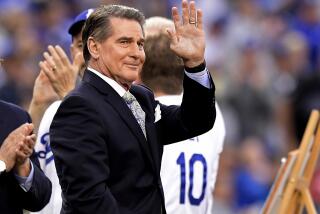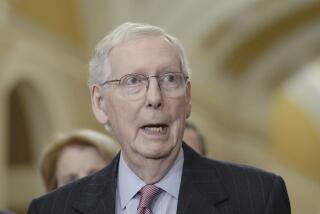When John McCain turned to politics, he went all-out
Navy liaison to the Senate:Second of two parts
-- John McCain’s ascension to Republican presidential nominee began 30 years ago in a cluttered office on Capitol Hill. There, Washington’s most privileged senators would drop by to hear the Navy pilot hold forth in a space so cramped his chair was jammed against the wall.
It was an odd scene for status-conscious Washington: the political cognoscenti hanging out with McCain, a 41-year-old war hero who was the Navy’s liaison to the Senate.
He was a glorified valet, really, assigned to arrange travel junkets and escort lawmakers overseas. But in a remarkable midlife reinvention, McCain went from senators’ factotum to senator himself. He turned his final military assignment into an apprenticeship and launched an unlikely political rise that could put him in the White House.
He did more than arrange their security and make sure they got to the proper hotel. He attached himself to men of power and studied how they worked. He enthralled them with tales of his captivity in Hanoi. He delighted them with his rough humor and supplied them with bottles of airline liquor smuggled into Middle East countries where drinking was outlawed.
FOR THE RECORD:
John McCain: An article April 15 in Section A about Arizona Republican Sen. John McCain’s start in politics misspelled a brand of whiskey. It is Johnnie Walker, not Johnny Walker. —
Soon the old bulls were maneuvering to sit next to the young captain on long flights: Republicans John G. Tower of Texas and John W. Warner of Virginia; Democrats Morris K. Udall of Arizona and Henry M. “Scoop” Jackson of Washington. The younger up-and-comers became his friends: Republican William S. Cohen of Maine stood as best man at McCain’s wedding; Democrat Gary Hart of Colorado was an usher.
And when McCain decided to make his audacious bid for Congress -- with no political experience and not so much as a home state from which to run -- his mentors handed him the ingredients for a campaign that succeeded on the first try.
That five-year chapter of the future Arizona senator’s life was an early example of the determination and dash that helped him survive 5 1/2 years in a prison camp, then win the nomination of a party that never much liked him. While his fiery temper and famous maverick streak made plenty of enemies, they were offset by a rakish charm that made as many friends, some who would play influential roles in his career.
“If we were going to be in a night session and had to kill some time, we would drop down there to his office, put our feet up and talk,” Hart recalled. “Sometimes McCain would regale us with stories. Sometimes we would tell him about what it was like to be in the Senate.”
The late ‘70s were a time of turmoil for McCain.
He came home from Vietnam to a strained marriage.
His wife, Carol, a former model, had been severely injured in an automobile accident.
His own injuries had grounded him -- his arms didn’t work right and one knee wouldn’t bend. It was doubtful that he could continue the legacy of his father and grandfather, both respected admirals. “I came home determined to excel in my family’s profession. . . . I think it’s fair to say, however, that the Navy had reservations,” McCain wrote in his memoir, “Worth the Fighting For.”
Through extensive therapy, McCain regained use of his knee and renewed his flight status. He went on to serve for 13 months as commander of the Navy’s largest aviation squadron before taking the job as Senate liaison.
He needed a new career. If the liaison job was short on prestige, it was long on access, and by his own account, McCain was “not overawed” by the powerful company he began to keep. Some of the Senate’s most prominent members were old friends of his distinguished father and had attended parties at the admiral’s Capitol Hill home. The POW bracelet worn by Sen. Bob Dole (R-Kan.) was inscribed with McCain’s name. The Reagans invited him for New Year’s celebrations after his release.
Indeed, the senators may have been more awed by McCain than McCain was by them. He was soon the most popular escort on congressional fact-finding trips, which went on for days and afforded face time no ordinary Navy captain could have imagined. He danced on the table of a Greek taverna with Delaware Sen. Joseph R. Biden Jr.’s wife, Jill, a red bandanna in his teeth, recounted McCain biographer Robert Timberg.
He took as many as 20 trips all over the world with Tower, the ranking Republican on the Senate Armed Services Committee, who treated him like a godson.
When they traveled to Middle Eastern countries that outlawed liquor, McCain would smuggle in mini-bottles of Johnny Walker he cadged from the airplane.
“These I would deliver to Tower’s room after I checked us in so that he and his traveling party could wind down in his accustomed way at the end of a long day,” he wrote of the legendary Texas senator, whose career would later be destroyed by accusations of womanizing and drinking.
While senators were growing enamored of their war hero, McCain was getting a firsthand glimpse of the power they wielded. He had mused about entering politics, but never seriously. His respect for Congress had eroded over the years, and he blamed civilian mismanagement for the outcome of the war and for disgracing the country he loved.
But the liaison job brought him closer to the internal workings of Washington than he had ever been, giving him a front-row view of what the right hands could accomplish. He watched armed services committee members scribble on scraps of paper amendments that came to dictate how the Navy operated.
“I had no idea of the full extent of their authority until I personally witnessed it in practice,” he wrote. His idle musings were turning to willful ambitions.
“I don’t recall him saying, ‘Gee whiz, I want to run for office someday, tell me how you do it,’ ” Hart said. “But he was clearly observant.”
Said Cohen: “I think he looked at us and said, ‘If they can do it, I can do it.’ ”
Part of McCain’s allure was not only his life story, but his willingness to tell it. He seemed to have emerged from years of torture with a broken body but a strong psyche, willing to relate hellish memories other POWs struggled to forget.
“Most of us tried not to say, ‘What was it like?’ ” Hart said. “But you’d be on a long flight and one thing would lead to another and he would start telling stories and they were fascinating.”
There was one McCain told about watching a Vietnamese woman through a crack in the cell door as she swept the courtyard every day; he built around her a fantasy so elaborate that he fell in love.
But McCain’s stature extended beyond resident storyteller. Senators sought his advice on the intricacies of aviation and how the Navy operated.
“We turned to him for straight talk on military affairs or who was testifying before us at hearings,” Cohen remembered. “We could always depend on John to say, ‘This is what’s going on . . . you can trust him, or this one is a little bit too political.’ ”
His influence over them was remarkable for his status. The first time Cohen met McCain, on a trip to China, McCain boldly suggested that Cohen, newly elected to the Senate, get himself onto the armed services committee.
“I was so impressed with him, I decided from that point forward to get on the committee,” said Cohen, who credits McCain with setting him on the path to his appointment years later as President Clinton’s Defense secretary.
It was not unusual for an ambitious aide to wangle time with influential senators, but in this case it seemed to be the other way around.
“Trust me. They were more interested in being his friend than he was in seeking them out,” said Rhett Dawson, who was then the Republican staff director for the armed services committee. “This was not him manipulating people to an end; this was them genuinely liking him, admiring him, enjoying his company and wanting to be his friend.”
McCain’s friends sensed that he felt his life had been spared for a purpose and that he was searching for a new way to serve his country. Once he decided on politics, he aimed high, setting his sights on a House seat.
Not only did he have no political experience, he had no constituency; an itinerant Navy brat born in the Panama Canal Zone, McCain never lived anyplace long enough to call home.
Then, while escorting a delegation in Honolulu en route to China, he met Cindy Hensley, the daughter of a wealthy beer magnate. He divorced his wife and married Hensley three months later. She was from Arizona.
Political strategist Jay Smith remembers a request to meet with a Navy captain who wanted to run for an Arizona House seat. He agreed only because it was Cohen who asked.
Sitting with McCain at a Washington restaurant, Smith marveled at his nerve. He wanted to run in Arizona, but he didn’t live there. “I don’t know for sure that he had set foot in the state. . . . I’d say the odds were virtually impossible,” said Smith. But by the end of the lunch, impressed by the McCain wit and charm, Smith had agreed to run his campaign.
McCain provided the life story and hard work -- the fair-haired candidate stumped so hard in the blazing heat that they called him “The White Tornado” -- and his mentors filled in the rest: fundraiser lists, endorsements, and all the professional advice he wanted.
In the days before the 1982 primary, McCain’s powerful connections paid off. A potentially disastrous telegram was released saying that Arizona Sen. Barry M. Goldwater believed McCain’s Republican opponents were more qualified.
Tower, who happened to be traveling in London with Goldwater, persuaded him not to talk to reporters until election day, leaving them to wonder about its authenticity.
“The whole thing just kind of went away,” Smith recalled.
The following Tuesday, McCain won his first election.
More to Read
Start your day right
Sign up for Essential California for news, features and recommendations from the L.A. Times and beyond in your inbox six days a week.
You may occasionally receive promotional content from the Los Angeles Times.






